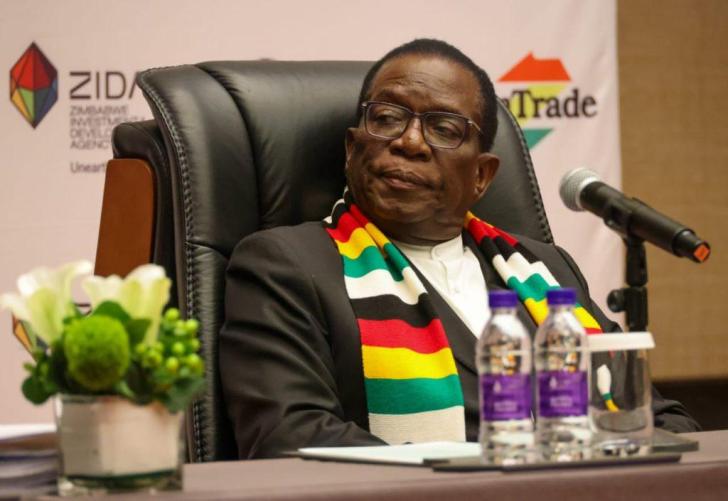News / National
Mnangagwa tells Zimbabweans to think outside the box
24 Oct 2024 at 06:58hrs |
0 Views

President Mnangagwa has urged all sectors of Zimbabwe's economy to embrace modern strategies and think outside the box as the nation works towards achieving upper-middle-income status by 2030. Addressing the Zanu-PF Central Committee in Harare yesterday, the President emphasized the need for innovation, research, and technology to accelerate the country's socio-economic transformation.
The Central Committee meeting was held ahead of the 21st National People's Conference, which will officially open in Bulawayo tomorrow under the theme, "Industrialise and Modernise Towards the Attainment of Vision 2030." The theme aligns with the President's push for rapid modernization and industrialization as essential pillars of Zimbabwe's development.
"At this critical stage of our national development, the importance of innovation, research, science, and technology in scaling up socio-economic transformation cannot be overemphasized," President Mnangagwa said. "All sectors are challenged to think outside the box and adopt modern tools so that we continue to be relevant, both now and in the future."
President Mnangagwa pointed out that the Second Republic has laid the groundwork for accelerated industrialization, driven by the country's rich natural resources, innovation, and local solutions. He highlighted the Heritage-Based Education 5.0 framework, which promotes research and innovation as key drivers for economic growth.
He also expressed confidence that the government is capable of delivering the people's aspirations through people-centered policies and unity of purpose, adding that these efforts would help lift many Zimbabweans out of poverty.
"Leveraging on our Heritage-Based Education 5.0 framework, we have laid the groundwork for accelerated industrialization and modernisation driven by our key national resources, innovation, research, and local solutions. Let us strengthen our resolve to face head-on the task before us of leading our own country, through our own wisdom and culture, using our own resources," said President Mnangagwa.
He also commended the increasing collaboration between the public and private sectors, particularly in innovation and technological development. The President noted the contributions of Zimbabwe's youth in embracing the government's call for innovation and industrialization, as evidenced by recent events such as the Presidential Innovation Fair and the Research Council of Zimbabwe Symposium.
"I commend the growing public and private sector collaboration in advancing our quest to realise Vision 2030 through harnessing innovation, science, and technology development," he said.
However, President Mnangagwa also stressed the importance of maintaining Zimbabwe's cultural identity amid modernization efforts. He urged the nation to learn from other countries while preserving its distinct cultural heritage.
"This is the core of who we are. Our people should learn from other nations, but our distinct identity must remain intact," he said.
As Zimbabwe continues its modernization journey, the President called on Zanu-PF members to actively participate in the country's industrialization and modernization agenda, rather than being passive observers.
The government's focus on modernization, innovation, and homegrown solutions is expected to play a pivotal role in propelling Zimbabwe towards achieving its Vision 2030 goal of becoming an upper-middle-income economy.
The Central Committee meeting was held ahead of the 21st National People's Conference, which will officially open in Bulawayo tomorrow under the theme, "Industrialise and Modernise Towards the Attainment of Vision 2030." The theme aligns with the President's push for rapid modernization and industrialization as essential pillars of Zimbabwe's development.
"At this critical stage of our national development, the importance of innovation, research, science, and technology in scaling up socio-economic transformation cannot be overemphasized," President Mnangagwa said. "All sectors are challenged to think outside the box and adopt modern tools so that we continue to be relevant, both now and in the future."
President Mnangagwa pointed out that the Second Republic has laid the groundwork for accelerated industrialization, driven by the country's rich natural resources, innovation, and local solutions. He highlighted the Heritage-Based Education 5.0 framework, which promotes research and innovation as key drivers for economic growth.
He also expressed confidence that the government is capable of delivering the people's aspirations through people-centered policies and unity of purpose, adding that these efforts would help lift many Zimbabweans out of poverty.
"Leveraging on our Heritage-Based Education 5.0 framework, we have laid the groundwork for accelerated industrialization and modernisation driven by our key national resources, innovation, research, and local solutions. Let us strengthen our resolve to face head-on the task before us of leading our own country, through our own wisdom and culture, using our own resources," said President Mnangagwa.
He also commended the increasing collaboration between the public and private sectors, particularly in innovation and technological development. The President noted the contributions of Zimbabwe's youth in embracing the government's call for innovation and industrialization, as evidenced by recent events such as the Presidential Innovation Fair and the Research Council of Zimbabwe Symposium.
"I commend the growing public and private sector collaboration in advancing our quest to realise Vision 2030 through harnessing innovation, science, and technology development," he said.
However, President Mnangagwa also stressed the importance of maintaining Zimbabwe's cultural identity amid modernization efforts. He urged the nation to learn from other countries while preserving its distinct cultural heritage.
"This is the core of who we are. Our people should learn from other nations, but our distinct identity must remain intact," he said.
As Zimbabwe continues its modernization journey, the President called on Zanu-PF members to actively participate in the country's industrialization and modernization agenda, rather than being passive observers.
The government's focus on modernization, innovation, and homegrown solutions is expected to play a pivotal role in propelling Zimbabwe towards achieving its Vision 2030 goal of becoming an upper-middle-income economy.
Source - The Chronicle
Join the discussion
Loading comments…



























